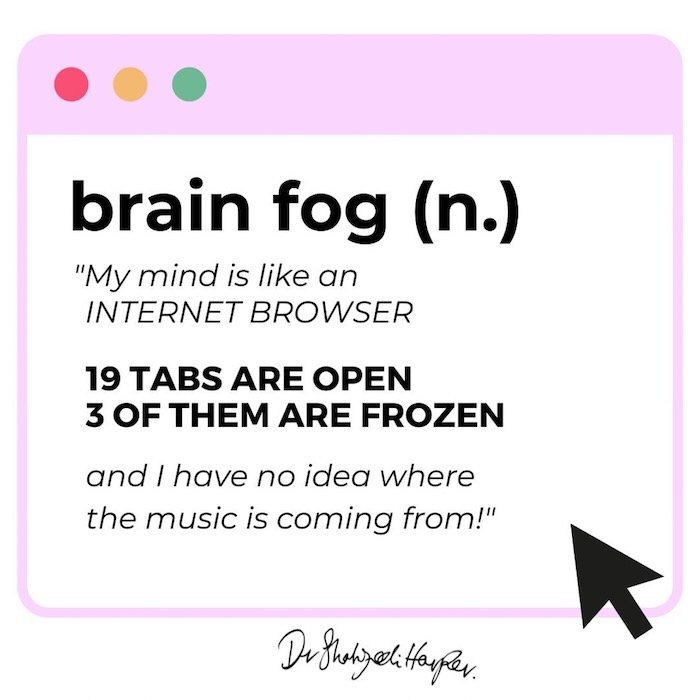Over-40 Brain Fog Is Real. Here are 4 Ways To Fight It.
Hint: One secret is in your pantry.
by The Candidly Team
If you’re in the realm of 40ish, I probably don’t need to tell you that brain fog is real. And at a time when we get to worry about dementia and Alzheimer’s and long Covid, it’s not really the funnest thing to think about. But, like every single symptom that relates to menopause and perimenopause, knowing what we can do about it empowers us to have a better experience with it.
Which is why it was such a relief to go straight to an expert, OBGYN and creator of The Galveston Diet, Dr. Mary Claire Haver, and find out exactly what we need to know about brain fog. She told us some specific things we can do to stay mentally sharp during this befuddling phase of life.
1. What are some basic symptoms of brain fog and can you help us differentiate it from just being endlessly exhausted and frazzled?
Women have long been talking about the maddening symptoms of forgetfulness, decreased alertness, and difficulty concentrating or thinking clearly during menopause, and recently there have finally been studies supporting what’s long been a reality.
“Brain fog might look like those moments when you're standing in the middle of the room and can't remember what you went in there for, or when the word is on the tip of your tongue but you just can't come up with it,” said Haver. “It's not a medical term, but it is how many people describe the memory and cognition changes that often occur in menopause. Being exhausted or frazzled tends to be more of a physical condition, whereas brain fog might be better described as a mental condition.”
2. Why does it get worse during middle age? Is it just an inevitable bummer symptom of menopause or can we get in there and do something about it?
When it comes to the brain changes that specifically occur during menopause, the loss of estrogen can be what’s steering the ship. “The amount of estrogen, and the neurological receptors for estrogen change in menopause, which can affect learning, memory, and regulation of sleep,” wrote Haver. “This decrease in estrogen has a direct impact on how the brain glucose metabolism functions and often results in cognitive decline.”
Sleep disruption can be a big piece of the puzzle, because when you don’t get good sleep, “your brain is not gonna function.” Another piece to consider is stress.
Estrogen and stress hormones have entirely opposite effects throughout the body. Estradiol positively affects the brain, while stress hormones negatively impact the brain and cognition, affecting our thinking and ability to respond to the environment, including how we remember, understand, learn, and process,” said Haver. “Estradiol is able to prevent the negative effects of stress hormones on the brain. As we age and our natural Estradiol levels diminish, and it becomes more difficult to combat the impacts of the stress hormones.
According to Haver, “estradiol therapy may decrease the body’s excess cortisol response to stress, preventing the adrenal glands from making more cortisol. Estradiol also protects the nerve cells in the brain from damaging chemicals, including cortisol.”
Hormone Therapy isn't an option for all women, however as Haver points out, that doesn't mean we don't have other tools to use. “Increasing Omega-3 Fatty acid consumption may help to relieve depressive symptoms, benefit emotional and cognitive behaviors, and lower inflammation in menopause. Adequate sleep, stress reduction,and limiting inflammation through your diet will also go a long way in helping with brain fog,” said Haver.
3. Is there anything we can do to prevent/ banish/shorten our bouts with brain fog?
When it comes to menopause “your body is undergoing a tsunami of hormonal changes. You have to fight back with a tsunami of lifestyle changes,” said Haver.
So when it comes to brain fog, as with most menopause conditions, she recommends what she calls her “Menopause Toolkit.” This consists of many lifestyle factors, including:
Anti-inflammatory nutrition
Adequate sleep
Practicing mindfulness or other stress reducing activities
Regular exercise
Potential pharmacology like menopause hormone therapy
Finding community
4. Is the right nutrition the secret? We feel like it might be the secret. What are a handful of things we should be eating more or less of to keep ourselves sharp mentally?
Limiting inflammation through nutrition can go a long way in helping to alleviate brain fog symptoms. Avoiding overly processed, sugar laden foods will help. As will increasing foods high in omega-3 fatty acids like salmon, mackerel, oysters, ground flax seeds, chia seeds, walnuts and soybeans. Including at least one great source of Omega-3 fatty acids in your diet each day is an excellent way to increase your overall health.
5. Any other major takeaways you don't want us losing to our own brain fog the minute we walk away from this article?
Treatment for menopause symptoms is not a one-size-fits-all situation, nor are the symptoms each individual may experience.
The good news is that there is a whole Menopause Toolkit available that can be customized for each individual's health needs. [The tools] can be used in full, or mixed and matched to meet each individual where they are.
This interview has been edited for length and clarity.
This article is for informational purposes only. It is not intended to be used in place of professional advice, medical treatment, or professional care in any way. This article is not intended to be and should not be a substitute for professional care, advice or treatment. Please consult with your physician or healthcare provider before changing any health regimen. This article is not intended to diagnose, treat, or prevent disease of any kind. Read our Terms & Conditions and Privacy Policy.
















